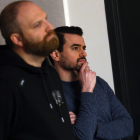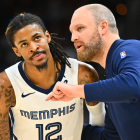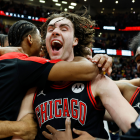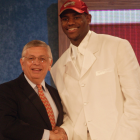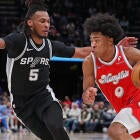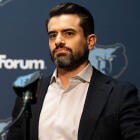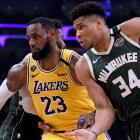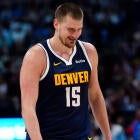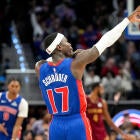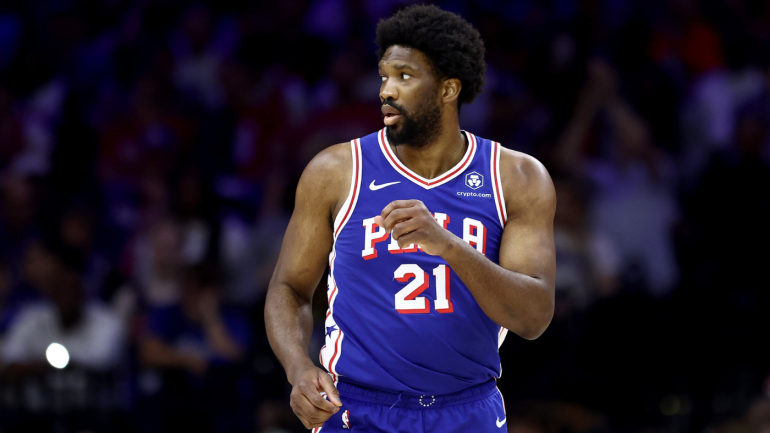
On Saturday, after the Memphis Grizzlies defeated the Philadelphia 76ers 124-107, star center Joel Embiid shoved Philadelphia Inquirer reporter Marcus Hayes after a locker room altercation. The two were quickly separated before Embiid left the building, but the incident is already under investigation by the NBA.
For now, there's no easy way to predict what sort of discipline Embiid might face. There simply isn't precedent to fall back on. Players and reporters certainly argue, but such disputes do not have a history of turning physical. So as the league sifts through the fallout of the confrontation between Embiid and Hayes, let's go through what happened, what we know, and what we can expect from here.
What led to the confrontation between Embiid and Hayes?
Before the 2024-25 season began, Embiid told ESPN that he was likely done playing back-to-backs. "If I had to guess," Embiid said, "I would probably never play back-to-backs the rest of my career." To that point, he had not played in a preseason game, and he ultimately missed the entire preseason. He has not yet played for the 76ers this season.
In response to Embiid's absence, Hayes wrote a story for the Inquirer on Oct. 23 entitled "Joel Embiid disrespects the Sixers, the game, its greats, and himself. Shaquille O'Neal and Charles Barkley are right to rip him." Embiid has faced criticism for the games he has missed due to injury for practically his entire career from both the Philadelphia media and the wider basketball world. However, this story was notable for bringing up Embiid's family. Though it has since been edited, this is how the story began when it was initially published:
"Joel Embiid consistently points to the birth of his son, Arthur, as the major inflection point in his basketball career. He often says that he wants to be great to leave a legacy for the boy named after his little brother, who tragically died in an automobile accident when Embiid was in his first year as a 76er," Hayes wrote.
"Well, in order to be great at your job, you first have to show up for work. Embiid has been great at just the opposite. Now in his 11th season, he has consistently been in poor condition. This poor conditioning apparently seems to have delayed his debut this season. Embiid won't play in Wednesday's opener or the next two games."
The story made minor waves upon publish, but as Embiid was injured at the time, he was not required to speak to media immediately. On Friday, Nov. 1, he addressed reporters for the first time since the Hayes story was published and pushed back on it.
"Everybody has been on the same page," Embiid said of the team's return-to-play and injury management plan for him. "If your body doesn't react well, and if your body tells you one thing (sit out). I've done it. From what I can tell you, I've broken my face twice, I came back early with the risk of losing my vision. I have broken fingers. I still came back. When I see people say he doesn't want to play, I've done way too much for this city, putting myself at risk for people to be saying that."
Hayes did not attend Friday's practice. He did, however, attend Saturday's game between the 76ers and Grizzlies.
What happened in the moment?
The most detailed first-hand accounting of the incident came from Kyle Neubeck of PHLY Sports.
Kyle Neubeck details the incident between Joel Embiid and a Sixers reporter after tonight’s game pic.twitter.com/aLwV5zrk4h
— Crossing Broad (@CrossingBroad) November 3, 2024
"We go to the locker room," Neubeck began. "Joel is seated in there. Marcus Hayes, who everyone knows was on Joel's radar this week, gave a lengthy quote taking shots at him yesterday, Marcus was present in the locker room, and the second that Joel realized he was there, got into a verbal back and forth. Obviously we can't repeat many of the words that were said on this show. The basic gist of it was 'you can say I suck, you can say whatever you want about me as a player, don't ever put my dead brother's name in your mouth, don't talk about my family, don't bring them into this. You wanna talk to me like a man and talk to me about basketball, that's different, but if you ever talk to me about my family again, we're gonna have real problems.' They go kind of back and forth, and at some point, let's say 90 seconds to two minutes into this back and forth, Joel shoves him. Team security steps in. Players kind of surround the situation, and everyone kind of dispersed."
Later reporting would fill in the blanks on what, specifically, was said. Most notably, Embiid warned Hayes not to speak about his family again. "The next time you bring up my dead brother and my son again, you are going to see what I'm going to do to you and I'm going to have to ... live with the consequences," Embiid reportedly said.
At one point, Hayes offered an apology, but Embiid declined it. "That's not the f---ing first time," the Sixers star said. Embiid would later say that he does not care what reporters say. Hayes responded "but you do." At that point, Embiid reportedly raised his voice, and the shove came not long after. The two were separated from there. Team security asked reporters not to report what happened between the two of them, but Embiid claimed he did not care. "They can do whatever they want," Embiid said. "I don't give a shit."
What can we expect on a possible suspension?
There's no reasonable way to predict what sort of discipline Embiid might face for this. While disagreements between players and reporters are common, there is simply not a known precedent for a such a dispute to become physical in the NBA. Historically, the league takes any violence from a player towards a non-player that occurs in an NBA venue very seriously, it's just that the non-player in question has never been a reporter.
There have been several incidents between players and fans that have led to suspensions, most notably the season-long ban of Ron Artest after the Malice at the Palace brawl. More recently, Patrick Beverley was suspended four games last season for throwing a ball at fans and an inappropriate interaction with ESPN producer Malinda Adams. However, his interaction with Adams was not physical. He simply refused to allow her to ask him a question because she didn't subscribe to his podcast.
There have also been physical disputes between players and coaches. In 1997, Latrell Sprewell was suspended for a year after choking head coach P.J. Carlesimo, and in 2018, J.R. Smith was suspended one game for throwing soup at assistant coach Damon Jones. More recently, Matt Barnes earned a two-game suspension in 2015 when he confronted then-New York Knicks coach Derek Fisher at the home of his estranged wife, Gloria Govin. Barnes was playing for the Grizzlies at the time, but was in Los Angeles at the time and got a call from his son, who told him Fisher was in the house with Govan. There was a physical altercation but no charges were filed.
There have been physical incidents between reporters and subjects in professional sports, but not in basketball, which USA Today covered in more detail in 2019. In 1978, between stints as manager of the New York Yankees, Billy Martin punched reporter Ray Hagar in Reno Nevada. In 1979, Boston Globe reporter Will McDonough punched New England Patriots defensive back Raymond Clayborn twice after Clayborn poked him in the eye. In 1993, Kansas City Royals manager Hal McRae threw an object believed to be a tape recorder at reporter Alan Eskew. In 1994, then-NFL quarterback Jim Everett flipped a table at Jim Rome during a televised interview and proceeded to shove him down. None of these incidents included suspensions. Former Mets pitcher Jason Vargas was fined in 2019 for threatening a reporter.
However, with no close analogues to what occurred between Embiid and Hayes, there's no easy way to predict how exactly the league will respond. For now, the investigation is ongoing.
![[object Object] Logo](https://sportshub.cbsistatic.com/i/2020/04/22/e9ceb731-8b3f-4c60-98fe-090ab66a2997/screen-shot-2020-04-22-at-11-04-56-am.png)










